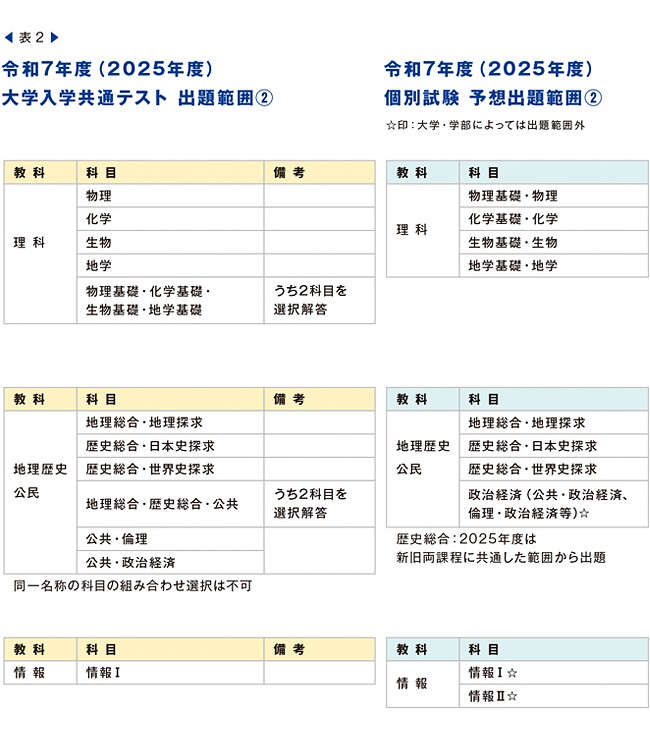Science hasn't changed much, geography, citizens, what to do with information
With this revision of the course of study, there is little change in science, so it seems that the range of questions for individual exams is the same as before, as shown in <Table 2>.
In addition, although it is a public citizen of geography, it will be common to set "geographical synthesis" and "history synthesis" as the question range according to the common test.Although the number of universities that have geography as an elective course has decreased, there are still many universities with a large number of applicants.At these universities, it is possible to make it a good question for more geographic enthusiasts by setting the question range to "geography synthesis".Geography of the common test is a subject that science students are forced to take, so questions for geography lovers must be avoided, but individual exams are taken by students who are good at geography.It is a place to show the skill of the questioner.By the way, although it cannot be conducted at present due to the corona sickness, the Department of Geography of a university in the Kinki area conducted an entrance examination for fieldwork by comprehensive selection.I've heard that entrance exams like this "Bura Tamori" were exploratory and enjoyable for both the university and the students.
Quiet talk break. Since "History synthesis" has elements of Japanese history and world history, it is possible to ask the knowledge of world history even though it is modern when it is called "History synthesis / Exploration of Japanese history".However, many of the examinees are studying Japanese history or world history in the upper grades of high school, so if you are asked questions from the standpoint that you can ask anything in modern times because the scope is "history synthesis", the examinees will be asked. I'm in trouble.Older students are more troubled.Therefore, at least in the 2025 entrance examination, it is necessary to have a proviso that "History synthesis will be given from the range common to both the old and new courses".In other words, it means that you will not be asked even if you are in the range of questions.

There is no rule that you have to ask all the fields of the entrance exam questions from the range of questions.Therefore, even after the entrance examination in 2026, it is not a violation of the rules even if the scope is "History synthesis" without this proviso, or if the questions are given only from "Japanese history quest" and "world history quest".However, from the standpoint of the examinee, if you do not ask questions, I would like you to exclude it from the range from the beginning, so stop the roundabout wording, and if it is Japanese history, it is a proviso as "History synthesis / Japanese history quest" from "History synthesis" Do not ask questions that require knowledge of world history. "
Lastly, regarding "information", students who take "information II" are considered to be mostly science students, so it is necessary to make the question difficulty a substitute for "math III" and "math C". It seems.If it is an information-related undergraduate department, instead of "Mathematics I / A, Mathematics II / B / C", there may be "Mathematics I / A, Information I, Information II", but the students who take the elective exam are I think it's pretty limited.
- 1
- 2
